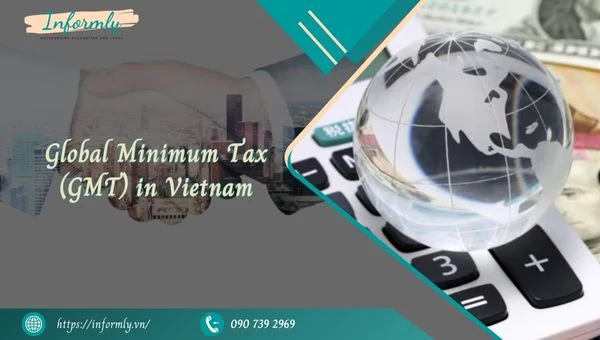The Global Minimum Tax (GMT), a groundbreaking initiative spearheaded by the Organization for Economic Cooperation and Development (OECD), has reshaped the global taxation landscape. Designed to curb tax avoidance by multinational corporations (MNCs), the GMT ensures that companies with revenues exceeding €750 million pay a minimum corporate tax rate of 15% in every jurisdiction where they operate. For Vietnam, a rapidly growing economy heavily reliant on foreign direct investment (FDI), the GMT presents both challenges and opportunities. This article explores the implications of the GMT in Vietnam, its implementation process, and how businesses and policymakers are adapting to this transformative tax reform.
What is the Global Minimum Tax?
The GMT is part of the OECD’s Two-Pillar Solution to address tax challenges arising from digitalization and globalization. Launched under the Base Erosion and Profit Shifting (BEPS) framework in 2013, the initiative gained momentum when 137 countries, including Vietnam, agreed to its framework in October 2021. The GMT, encapsulated in Pillar Two, aims to prevent MNCs from exploiting low-tax jurisdictions by shifting profits to minimize their tax liabilities. If a company’s effective tax rate (ETR) in a jurisdiction falls below 15%, a “top-up tax” is levied to bridge the gap, either by the host country or the MNC’s home country.
Vietnam, known for its competitive tax incentives to attract FDI, has historically offered corporate income tax (CIT) rates as low as 10% or even tax exemptions for certain industries. The introduction of the GMT, effective globally from January 2024, challenges this model and requires Vietnam to rethink its tax policies to remain an attractive investment destination.

Vietnam’s Economic Context and the Role of FDI
Vietnam’s economic growth over the past two decades has been remarkable, with a GDP increase from $99 billion in 2009 to approximately $360 billion by 2024. Much of this growth is attributed to FDI, which accounts for over 70% of Vietnam’s exports. Major MNCs like Samsung, Intel, LG, and Foxconn have established significant operations in Vietnam, drawn by low labor costs, political stability, and generous tax incentives. For instance, Samsung alone has invested $18 billion in Vietnam, employing over 100,000 workers and contributing nearly 20% to the country’s export revenue.
These tax incentives, often below the 15% GMT threshold, have been a cornerstone of Vietnam’s FDI strategy. However, the GMT threatens to diminish their effectiveness. If Vietnam continues to offer tax rates below 15%, the top-up tax will be collected by the MNC’s home country, reducing Vietnam’s tax revenue and potentially discouraging future investments. This shift has prompted Vietnam to act swiftly to align with global standards while preserving its competitive edge.

Implementation of the GMT in Vietnam
Vietnam’s commitment to the GMT was formalized through Resolution 107/2023/QH15, passed by the National Assembly on November 29, 2023, and effective from January 1, 2024. The resolution introduces two key mechanisms: the Qualified Domestic Minimum Top-up Tax (QDMTT) and the Income Inclusion Rule (IIR).
- QDMTT: This allows Vietnam to collect the top-up tax locally if an MNC’s ETR falls below 15%. By implementing the QDMTT, Vietnam ensures that tax revenue remains within its borders rather than being redirected to the MNC’s home country.
- IIR: This rule applies to Vietnamese parent companies with subsidiaries abroad. If the subsidiaries’ ETR is below 15%, the parent company must pay the top-up tax in Vietnam.
The General Department of Taxation (GDT) oversees compliance, requiring MNCs to submit detailed annual tax returns, including global income, taxes paid, and top-up tax calculations. Deadlines for QDMTT and IIR payments are set at 12 and 15 months after the fiscal year, respectively, with an 18-month extension for the initial year. Non-compliance carries significant penalties, emphasizing Vietnam’s commitment to enforcement.
The Vietnamese government has also established a task force to assess the GMT’s impact and develop a legal framework. This includes drafting amendments to the Law on Corporate Income Tax to integrate GMT provisions, ensuring alignment with OECD guidelines while addressing local concerns.

Impacts of the GMT on Vietnam
The GMT’s implementation in Vietnam has far-reaching implications for businesses, policymakers, and the broader economy. Below are the key areas of impact:
1. Reduced Effectiveness of Tax Incentives
Vietnam’s tax incentives, such as four-year tax exemptions followed by nine years at half the standard 20% CIT rate, have been instrumental in attracting FDI. The GMT renders these incentives less appealing, as MNCs will face top-up taxes regardless of local rates. For example, Samsung, which benefits from preferential rates in Vietnam, could owe up to $6.5 billion in top-up taxes to South Korea’s National Tax Service for its incentive period up to 2024. This shift may prompt MNCs to reassess their investment strategies in Vietnam.
2. Potential Decline in FDI Competitiveness
Vietnam has positioned itself as an alternative manufacturing hub to China, attracting giants like Apple and Nike. However, the GMT could reduce Vietnam’s competitiveness if other countries offer alternative incentives compliant with OECD rules. The Ministry of Finance estimates that 112–122 MNCs, representing 30% of Vietnam’s FDI capital, will be affected by the GMT. Without strategic countermeasures, Vietnam risks losing FDI to countries like Indonesia or India, which are also adapting to the GMT.
3. Increased Tax Revenue
On the positive side, the GMT is expected to boost Vietnam’s tax revenue. By collecting top-up taxes through the QDMTT, Vietnam could generate an additional 14.6 trillion Vietnamese dong ($600 million) annually. This revenue can be reinvested in infrastructure, education, and healthcare, supporting sustainable economic growth.

4. Challenges in Compliance and Administration
The GMT introduces complex reporting requirements, necessitating robust IT systems and skilled tax professionals. Vietnam must invest in data management and training to handle calculations of ETRs, transfer pricing, and exclusions. Additionally, existing bilateral tax treaties may require renegotiation to align with GMT rules, posing administrative hurdles.
5. Shift in Investment Strategies
The GMT encourages MNCs to prioritize substance-based investments, such as physical assets and payroll, which qualify for exclusions under the OECD’s GloBE rules. This could lead to deeper integration of MNCs into Vietnam’s economy, fostering job creation and technology transfer. However, it may also deter investments in sectors with high tax elasticity, where tax incentives were a primary driver.
Vietnam’s Response: Balancing Compliance and Competitiveness
Recognizing the GMT’s challenges, Vietnam is proactively adapting its policies to maintain its appeal as an FDI destination. Key strategies include:
- Alternative Incentives: The government is exploring non-tax incentives, such as cash grants, tax credits, and infrastructure support, to offset the GMT’s impact. A draft resolution from August 2023 proposed support for high-tech companies, though broader measures are needed to benefit all affected MNCs.
- Investment in Infrastructure: By redirecting tax revenue to improve logistics, industrial zones, and digital infrastructure, Vietnam aims to enhance its business environment, compensating for reduced tax advantages.
- Collaboration with Stakeholders: The government has engaged with MNCs, industry experts, and international partners like South Korea, Japan, and the EU to develop GMT-compliant policies. This collaborative approach ensures that incentives align with global standards while addressing local needs.
- Capacity Building: Vietnam is investing in training tax professionals and upgrading IT systems to streamline GMT compliance. This enhances transparency and reduces the administrative burden on businesses.
Opportunities for Vietnam
While the GMT poses challenges, it also offers significant opportunities for Vietnam to strengthen its economy:
- Enhanced Global Reputation: By aligning with international tax standards, Vietnam reinforces its commitment to fair taxation and global cooperation, boosting its credibility among investors and partners.
- Sustainable Development: Increased tax revenue can fund critical sectors like renewable energy, education, and healthcare, aligning with Vietnam’s sustainable development goals.
- Diversification of Investment: The GMT encourages Vietnam to diversify its FDI strategy beyond tax incentives, focusing on innovation, technology, and high-value industries.
- Regional Leadership: As neighboring countries like Malaysia and Singapore implement the GMT, Vietnam has a chance to lead in developing adaptive policies, setting a model for emerging markets.

Challenges Ahead
Despite these opportunities, Vietnam faces hurdles in fully integrating the GMT. The transition requires balancing short-term revenue gains with long-term investment attractiveness. Smaller businesses, not directly subject to the GMT, may face indirect impacts as MNCs adjust their supply chains. Additionally, delays in policy finalization could erode investor confidence, especially if competing countries act faster.











